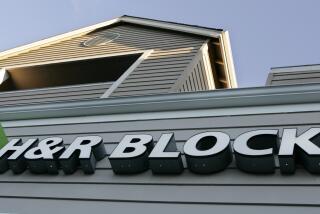The Annual H&R; Block Party : Veteran Tax Preparer Stays No. 1 by Sticking to Its Core Business
Any business would love to have loyal customers like Ginny Wetzel. The La Canada housewife and former insurance agent has used the same tax preparer for about seven years, and she doesn’t plan to change.
“They’ve got a good reputation,” she says of her preparation firm. “And they save me money,” she adds, noting that she received a refund of $1,000 last year after not expecting any money back.
Wetzel’s tax preparer is not a high-powered accounting firm or hotshot tax attorney. It’s H&R; Block.
Despite its reputation as the low-priced plain vanilla of tax preparation, H&R; Block continues to dominate that otherwise fragmented business, thanks in part to loyal clients like Wetzel.
H&R; Block’s name is synonymous with tax preparation. As this year’s tax-filing season winds to a close, Block will prepare one of every 10 individual tax returns, and two of every 10 who use professional preparers. No other firm comes close to Block’s market share. Three of every four clients each year are repeaters.
“I don’t know of many industries where one firm dominates so greatly,” says David W. Lieberman, president of Triple Check Income Tax Service in Burbank, a distant second behind Block among tax preparation franchise chains.
Dominance Pays Off
That dominance had paid off at the bottom line. Block’s earnings have risen steadily for more than a decade, and cash dividends have been raised in each calendar year since 1962.
To be sure, Kansas City-based Block is not without its problems or challenges. The firm’s moves in recent years to reduce its dependence on the cyclical tax preparation field--while generally regarded as successful--lately have run into snags.
And continuing to wring more and more growth out of its bread-and-butter business is a difficult feat because of its already large market share. Although the firm gained market share last year as tax reform prompted more taxpayers to seek professional assistance, the firm cannot expect Congress to tinker with the tax laws every year. The firm’s growth in new clients so far this year has fallen below some analysts’ expectations.
But Block appears in virtually no danger of losing dominance in its core business--a status earned and maintained in part because it was the first with the most, analysts and competitors say.
The firm, founded in 1955 in Kansas City by brothers Richard and Henry Bloch, was really the first to franchise tax preparation services nationally under a single name, Triple Check’s Lieberman says. It now operates about 7,500 offices nationwide, targeting low- to middle-income taxpayers who don’t want to do their own returns yet also don’t want to pay the higher prices charged by accountants, enrolled agents and attorneys.
Fee Went Down
Block’s average fee actually went down last year, to just under $50, largely because tax reform made completing returns simpler and quicker for many taxpayers who do not itemize. This year, however, the average fee is expected to increase slightly but still stay around $50, says Thomas M. Bloch, H&R; Block’s president of tax operations.
Others have tried to emulate Block’s formula, but with little success. Often it’s been a story of too little, too late.
“They have such an extensive advertising budget and so many offices,” Lieberman says. “Their physical presense is hard to overcome. They’ve made themselves available to such a wide group, it’s become an institution that is somewhat hard to combat.”
Company co-founder Henry Bloch’s name has become such a household word through the firm’s own advertising that he is currently featured in radio and television ads promoting a rebate program offered by Subaru, the Japanese auto maker.
The Block firm has also maintained its market share by stressing quality--and achieving it.
The firm, Bloch says, stands behind its work, offering such services as accompanying clients in audits at no additional charge.
“People keep coming back because they’re satisfied,” says Hannah Bruce, an analyst who follows Block for the investment firm of Tucker, Anthony & R. L. Day in New York.
The high rate of repeat business is remarkable when one considers that Block’s force of tax preparers is seasonal by nature. Many carry other jobs the rest of the year or are retirees who want to keep active and earn a few bucks on the side.
But about three-fourths of its preparers come back every year, keeping satisfied customers coming back as well, analyst Bruce says.
The low rate of preparer turnover stems in part from the firm’s incentive pay and commission structure, which includes giving preparers a percentage of the revenue they produce each tax season. That percentage starts at 20% for first-year preparers and rises one point each year until it tops out at 30%.
“The more hours you work and the more returns you prepare, the more you make,” Thomas Bloch says.
Block also resists the temptation to offer a broader range of accounting services, or financial planning. “We do not want to become the supermarket of financial services,” Bloch says. “We know what we do well and want to stick with it.”
He adds: “We believe in specialization. If you want advice on stocks or municipal bonds, that is not our forte.”
But to provide more stability to its highly seasonal earnings stream--it loses money in all quarters but the one during tax preparation season--the firm began to diversify several years ago. It now owns CompuServe, a major computer services business; Personnel Pool of America, a leading supplemental personnel agency, and Path Industries, a business seminar and training concern.
However, many analysts following H&R; Block have lowered their earnings estimates for it this year, in part because of difficulties facing the non-tax subsidiaries.
Personnel Pool is facing stiff competition and a slowdown in demand for temporary workers, says Emma W. Hill, an analyst at the New York investment house of Wertheim Schroder & Co. In addition, Path Industries is suffering from slowing growth in revenue and higher costs, squeezing profits, Hill says.
Fallen Short
Meanwhile, growth in the tax business has fallen short of some analysts’ expectations for this year, perhaps because Congress did not significantly alter the tax laws for 1988. Thus, some taxpayers may have gone back to preparing their own returns.
Also, the firm’s Rapid Refund program may not be growing as rapidly as hoped, analyst Hill says. Under Rapid Refund, Block offers customers quicker refunds by filing returns directly with the IRS electronically through computers. Block has about 80% of the electronic filing business.
Despite these snags, analysts still expect earnings to rise in the current fiscal year from the $87.9 million that H&R; Block earned on revenue of $794.1 million in the year ended April 30, 1988.
Just over half of that revenue and nearly three-fourths of operating profits derived from tax preparation, analyst Bruce says. Thus, the biggest challenge facing the company, she says, continues to be how well it can continue to expand that core business.
Thomas Bloch agrees. The firm’s biggest task is to gain as customers some of the 55% of taxpayers--more than 50 million households--that don’t use any tax preparer.
“We consider them to be our biggest competitor,” Bloch says.
More to Read
Inside the business of entertainment
The Wide Shot brings you news, analysis and insights on everything from streaming wars to production — and what it all means for the future.
You may occasionally receive promotional content from the Los Angeles Times.







